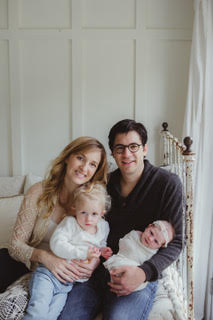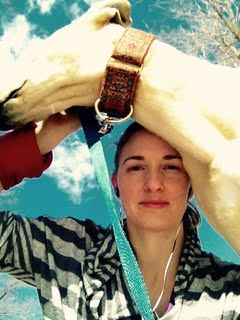Welcome to another installment of Interviews with Real Female Physicians. The goal of this series is to share their story so that you, the reader, may learn and be inspired by their experiences – good and bad. We all come from different backgrounds and have different situations. Some of you are married, some are not, some with kids, some with blended families. Let’s show other women that any of these can work financially!
So let’s introduce our next woman physician rockstar – Joy!
Tell us about yourself:
I am Joy Hughes, and I am a recent graduate from general surgery residency with a fellowship in Trauma/Critical Care, living in Rochester, MN. My husband is a neurosurgery chief resident, and he will finish training in June 2019. I have a 2-year-old girl and a newborn. I am currently in a research fellowship and scheduled to start trauma and acute care surgery locums assignments in a few weeks.
My hobbies are hiking with my dog, Ramble, and playing outdoors as much as possible. At this point in life that is usually on the playground, but I like canoeing, kayaking, and biking as well. I read as much as possible, but resort to audiobooks most of the time given the attention needed for my girls.
"Really think about what YOU want and don’t be afraid to put your personal happiness as a priority." Click To TweetI am from Mississippi, spent some of my childhood in a very rural area with lots of land and animals, and then moved to a suburb of Jackson, MS, where I went to high school. I lived in Mississippi until matching at Mayo in Rochester, MN, where I have lived for the past 6 years. This is a very low-cost of living area.
As far as specialty choice goes, I did a lot of soul-searching during residency to pick my specialty. I started out determined to be a cardiac surgeon, and due to feeling like I was very invested in my mentors and had their expectations of me to pursue that specialty, I had a very hard time admitting that Trauma/Surgical Critical Care was just a whole lot more fun. Once I finally gave myself permission to change rails, I was very happy with the career choice, and I also felt more confident about starting a family. I got pregnant the next year and am so glad I made this change. (I know there are many women who have made the mom+cardiac surgeon combo work, but I don’t believe that I could have). My advice for anyone trying to choose a specialty is to really think about what YOU want and don’t be afraid to put your personal happiness as a priority. I regret trying to live up to some crazy ideal about the invincible smart career woman rather than just admitting I wanted to daydream sometimes and snuggle with my babies, husband, and puppy dog a lot. Life is meant to be savored. Having a meaningful and challenging career is wonderful, but I’ve committed to always make time for the fun stuff, too.
We both ultimately want to do global surgery work. I feel like trauma/critical care is great for that field, and my husband is finding many opportunities to contribute as well. He has never wavered from his specialty choice, but definitely asked many times whether it would be practical in the humanitarian sphere. Ultimately, I think all medical fields are needed and you can find a way to contribute with any set of skills; however, I like that trauma is so connected to current events and to the local community.
Did you graduate with student loans?
I did graduate with about $40,000 in loans from med school and some from college, but my parents had committed to pay those so I didn’t pay much attention to the number. My husband and I went to med school together; I had a full-tuition scholarship and he had full-tuition plus living expenses contingent on a commitment to return to the state after training. I took out about $8000 per year of subsidized loans to give us a little extra to live on and then took out extra our 4th year to pay for the 50 interviews we went on between us (couples matching general surgery + neurosurgery is a bear!) Our medical school was public and very cheap the first year; tuition went up noticeably by our 4th year.
I did not consider the PSLF because my total loan amount was low and I was very skeptical of the program anyway. I kept my loans on the standard 10-year repayment schedule through residency, and recently consolidated with SOFI. I have $48,000 left including my loans from college, which I took off my parents’ hands. Depending on which job I take, my loans will either be paid off by my employer or I will pay them down aggressively after fully funding all tax-advantaged retirement accounts. I have a ~4% interest rate with SOFI, so even if it takes me a few months longer to pay off the amount due to investing, I think that’s the better strategy.
Financial Aspects of Kids

When did you have them?
I had my first baby at the very beginning of my PGY4 year and recently had another shortly following completion of residency and fellowship.
Are you planning to fund their college expenses?
Yes, I do plan on funding some type of college fund; we haven’t started this yet as we are still on resident salaries. I honestly don’t know much about the specifics of the options, but I have a vague knowledge that some states allow pre-paid tuition, which might be an option depending on where we move for jobs. My dad has started a college fund for each of the girls, so at least they have something right now; I’m anxious to get this started as soon as we are on solid ground next year.
What are your child care expenses?
I had my first child after lots of careful consideration, including mapping out the childcare strategy for the rest of residency. We had an au pair plus day care until I graduated residency. Now with my research position, we are down to just daycare. The au pair program was great for us and really allowed me to have a pretty stress-free childcare situation. The au pair was approximately $24k per year and daycare is another $7200, so that’s around $31k.
Financial Aspects of Marriage
Are you married? Are you divorced? Remarried?
I am married, 13 years next month.
Did you get a pre-nuptial or post-nuptial agreement?
Ha, no, we got married my senior year of college. We are pretty evenly matched and have been together so long I honestly can’t imagine divorce; that would be quite the tsunami of personal crises!
Do you and your partner agree on finances?
Yes we agree on finances; we both listened to Dave Ramsey a lot in college and did the Total Money Makeover course at our church. Neither of us are into “stuff” like cars, clothes, or jewelry. I’ve gotten into the FIRE literature this year and he hasn’t had time to read up on it, but he listens politely and lets me tweak our budget as long as I don’t cut into his craft beer and taco money. We aren’t on the envelope system per se, but we do have reasonable spending habits that are leftover from living on a shoestring budget in college and med school. Our goal is to do mostly charity work so we make a strong effort to resist lifestyle creep.
Does your spouse stay at home?
Oh man, how often I have been jealous of people who have stay-at-home spouses… As I mentioned above, he’s a neurosurgery resident so we’ve been grinding out the residency workload for 6+ long years. However, I do think there is tremendous value in having a partner who “gets it.” We can gossip about the same work-related topics and bounce ideas and consults off each other. While I get a little melodramatic about it sometimes, it is a pretty great arrangement.
Have you made any financial mistakes?
Our biggest mistake was buying a house in med school. We lived in cheap apartments with thin walls, and I really wanted a dog. When a cute little townhouse came on the market in our neighborhood, I calculated that the mortgage would be about the same as our rent, so we took a “med student mortgage” from our very generous local bank and bought it. As Dave Ramsey would say, “Murphy moved into our spare bedroom,” and we had to pay a ton of money for repairs when it flooded while we were on vacation (due to city drain backup). We couldn’t sell it right away and ended up eating so many costs for various things; it was very stressful to deal with at the beginning of residency. The mental energy expended on that catastrophe was worse than the financial hit. We were so cash-poor due to that house that we didn’t go on group vacations with our friends in residency, which I sincerely regret.

General Finances
What’s your FI (financial independence) number?
Short answer is we don’t really know our FI #. We want to be completely debt-free with fully-funded retirement accounts and are thinking $3.5M would technically be “FI.” However, we are reading quite a bit about optimizing our altruism ability, and it may make more sense for us to continue in high-earning jobs (presuming we like to work), and give more money away (as opposed to giving more time as volunteers). Additionally, we would sincerely consider taking a “mini-retirement” to do volunteer work as surgeons for a couple of years and then re-entering the U.S. workforce to make some money down the road. We will see as the story unfolds!
Who handles the finances in your relationship? Do you DIY or do you have a financial advisor?
Our “handling” of finances has been pretty minimal through residency. Everything was on auto-draft and we lived within our means and managed to save around $15-20k for an emergency fund. During au pair years we dipped into our savings a bit and I kept a close eye on that and forecasted how much we would need before we started the process. I’ve implemented some travel credit card hacking and also have been putting a plan together for investments next year, so I would say that I’m the more proactive one when it comes to finances, but my husband is not really on a strict budget or anything.
What is your net worth?
Cash: ~$16k
Retirement: $20k each =$40k
Home equity: ~$30k
Debt: $7000 (car and medical bills) + $48k (my student loans) +/- $150k (his “scholarship” that we will have to pay back if we don’t return to home state).
Equals somewhere between -$119k to +$31k.
How are you saving for FI/retirement?
We each have a non-matched 401k through work (they exclude residents from matching benefits, grrrr!) that we set up to withdraw 5% of our income during our orientation day 6.5 years ago. I am starting locums next week and will set up a solo-401k and put as much as possible into that. The plan is to utilize tax-advantage retirement accounts including Roth and HSA next year when we start our real jobs.
Biggest financial failure/regret:
That damn townhouse and not starting to save more earlier. I think it’s true that if we had started saving 10% toward retirement, we just wouldn’t have seen that money and wouldn’t have missed it, especially since we get a small raise every year of residency. I also regret not giving more to charity during residency. We have funded a few small projects; I “adopted” an elephant, we gave to compassion int’l, supported a local public radio station, and gave to various charities along the way, but I wish I had a passion project that I gave to in a really meaningful way.
One thing you wish you knew:
I wish I had known about the concept of FI earlier. The principles aren’t just about money; it’s about optimizing your lifestyle and decisions so that you are only spending time and energy (and money) on what truly brings you happiness and purpose. These concepts would have helped me so much as a junior resident, and I’d be in a better place financially.
Do you have insurance?
This stresses me out almost daily. I was on the fence about taking out LTDI at the beginning of this year, but I have some coverage (admittedly insufficient but it’s something) as a benefit from work, so I justified putting it off one more year until we get real salaries. I’m not sure I made the right decision but I have a vague feeling that I can’t afford it. While I’m writing this I’m thinking maybe I should just take out a policy now. We have an umbrella policy through State Farm along with our house and car insurance.
Any parting words of wisdom?
Our financial discussions revolve around how we can get ourselves in a position to do humanitarian work. There are so many different possibilities and strategies that it’s a bit overwhelming. I’m thankful to have found folks like WCI, POF, and Miss Bonnie MD. The information they provide is life-changing, to put it mildly. It’s absolutely liberating to discover these principles and philosophies. I encourage everyone to go down the FIRE rabbit hole, find your “people” on your favorite blogs and forums, and search for your pearls.
Tell readers a fun/random fact about you:
I majored in math and English in college and did an honors thesis in non-Euclidean trigonometry. I wasn’t sure I should be a doctor until my junior year.
Where can people connect with you?
My husband and I have a website with blog and podcast at indiedocs.org. We discuss our plan to pursue humanitarian medicine careers and all relevant topics, including the job search, financial independence, traveling, etc. The podcast features the stories of physicians who are actually doing global health missions, as well as some episodes where we get personal about our journey.
Twitter: @indiedocs1
Instagram: indiedocs
Facebook page: Indie docs

Get the bestselling book - Defining Wealth for Women.




